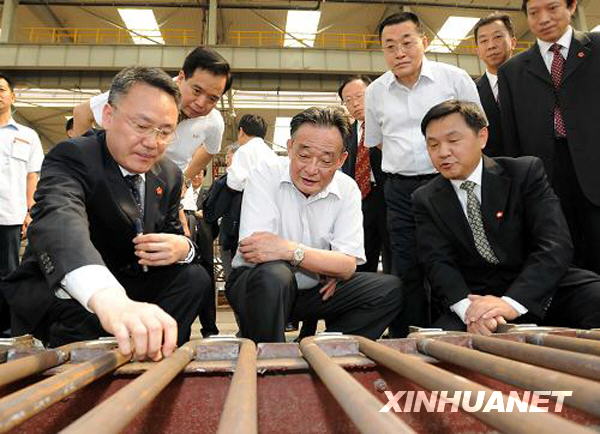Senior Chinese leader Wu Bangguo urges in Hefei Tuesday the role of low-carbon economy in the development of east China's Anhui Province.
 |
| Wu Bangguo, a member of the Standing Committee of the Communist Party of China Central Committee Political Bureau, made a visit to east China's Anhui Province between July 2 and 7. |
"As the world is focusing on low-carbon economy, we should seize the opportunity by promoting solar, wind and other reproducible energies, providing endless power for the sustainable development of the country's economy," said Wu, a member of the Standing Committee of the Communist Party of China Central Committee Political Bureau, during a visit to Anhui between July 2 and 7.
Wu praised Anhui's Conch Group for growing from a small cement factory to one of the country's largest construction material companies.
"The company has been promoting environmental protection by reducing the consumption of coal and the emission of carbon dioxide, which, in return, brought more profitable opportunities for the company," he said.
In 2007, Conch began to cooperate with foreign groups in making energy-saving equipment. As of the end of May 2009, Hailuo had sold 96 energy-saving power generators to 20 domestic and foreign cement companies.
Wu, also chairman of the Standing Committee of the National People's Congress (NPC), or top legislature, also visited the country's leading automobile maker Chery, headquartered in Anhui's city of Wuhu.
According to sources with Chery, the company is shifting its focus from oil-fueled cars to electric and hybrid-energy vehicles. Under the policy of expanding domestic demand, Chery's sales from January to May achieved a year-on-year rise of 60 percent.
"The global financial crisis has brought both challenges and opportunities. While ensuring the steady and rapid economic development, we should also see clearly ahead and change the pressures from the market into momentum."
Wu especially stressed the development of the north region of Anhui.
Six cities of Fuyang, Bozhou, Huaibei, Huainan, Suzhou and Bengbu are in the north of Anhui. With 46 percent of the province's population, these cities only accounted for 20.4 percent of the province's financial income in 2008.
"The north region of Anhui is the country's important food-producing area and coal energy base. Its development considerably affects Anhui's overall situation," Wu added.